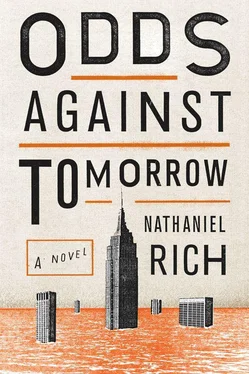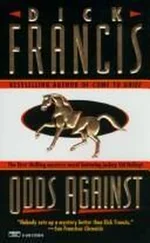He saw how it would be to surge through the wave breaks, the river licking up against their prow, Bergen County vastly looming ahead.
“So I’m stuck in a boat with a lunatic,” she said. “A raving, deranged—”
“Not at all. It doesn’t get more pragmatic than this.”
“You’re not doing this to be romantic, are you?”
“I’m doing it to survive. Our worst-case scenario is also the most likely one. We stay indoors, we starve. Or worse — we’re attacked by looters searching for food. It’s safer on the water.”
“I guess … Maybe we’ll come across a police boat. I thought I heard a helicopter, but I don’t think they can see down here until the fog clears.”
The canoe had veered, without Mitchell’s notice, toward the east side of the street, and now they were over the sidewalk, floating beneath the arcade of a fifty-floor office building. The canoe skidded over a round planter in which a ficus tree had somehow survived the storm. Its sodden leaves dragged in the water. The glass windows and doors that separated street from lobby had blown out, and Mitchell had the impression of entering an aquarium tank. There was a disturbance on the surface, and he noticed a pair of fish, each roughly three feet long, with large, puckering mouths and upper bodies streaked with olive and brown lines. They swam in lazy figure eights in front of the half-submerged security desk.
“Striped bass,” said Jane. “Why not.”
With a hard pull Mitchell pivoted the canoe around a black column and they were back into the middle of the avenue.
“I’m thinking we stay east,” said Mitchell, “then we can cut across once we’re farther north.”
“Why not go west? That way we can at least make it to dry land. The flooding must be worst closer to the East River. Doesn’t the elevation drop as you move east?”
“Yeah, the gradient is pretty sharp. The middle of the island is probably dry. But if we abandon the canoe, we might end up stranded, and surrounded by water. Out here at least we can move around.”
But Jane, on the verge of tears, insisted, and Mitchell conceded that there was probably a better chance of being rescued on the dry part of the island. At the corner of Fortieth Street they turned west. The water level dropped the farther inland they went. By the time they reached Lexington it was shallow enough that they could see the pavement beneath their oars.
“Almost there!” said Jane. Her brow was smudged from the black water. “I knew it.”
He felt good. Strong even. But then he started to hear the noises.
* * *
First there came a large splash directly ahead of them. This, in itself, was not particularly odd; they’d been hearing objects falling into the water ever since the moment they’d left Mitchell’s apartment building: burning debris, chunks of plaster. For that reason they’d kept to the middle of the street. But this first splash was followed directly by a second, and then a third, so it began to seem as if someone were tossing objects into the water on purpose. A window exploded, as if struck, and finally, unmistakably, they heard the sound of hollering men. It was difficult to make out words, but the voices were anxious and violent. After they glided past Park Avenue Mitchell told Jane to stop paddling and they drifted, listening. Once they were within about twenty yards of Madison, the canoe ran onto dry macadam, coming to rest behind a van parked in the middle of the street. There was a crash ahead and they began to make out through the mist the dark forms of men swinging metal bars into the windows of a deli on the corner. When the windows shattered, the men kicked the glass into the street. Then they attacked the store, overturning shelves and counters, grabbing as many liters of soda, beer cans, bags of potato chips, and boxes of candy they could carry. Already they had become animals. Snarling, brutish, hateful. Was it that easy, the transition into savagery? Was it also inside him?
In the middle of the avenue two men wrestled on the ground. Beside their entangled bodies stood a shopping cart loaded with bundles of logs and bags of charcoal. The cart tipped over when a gang of young boys ran by; they were chasing a bald man with a liver spot on his forehead. He wore a torn blazer. The boys laughed and shouted obscenities; the man was sweating profusely despite the cool, foggy air, and screaming for help. In his arms he cradled a gallon-size tank of water like it was a fat baby.
“We should never have left your house,” said Jane, her voice a frantic whisper.
Mitchell hooked one leg out of the canoe, pushing backward until the water was deep enough to float it.
“It’s OK,” he said, as much to himself as to her. He began backpaddling frantically. “We’re OK. We’ll go east.”
“How do you know that will be safe? The water will be higher.”
“You can trust me,” he said.
The crazy thing was that he actually believed it.
3.
Grand Central was darker than he expected — larger too. As they glided in, the two-tiered concourse opening around them, it was like passing from the mouth of a river into a lake — or a sea, since it was impossible to perceive its boundaries. The great arched windows on the terminal’s west wall had lost hundreds of panes during the storm, and the light that filtered through was viscous and gray. The expansive vaulted ceiling was as dark as the night sky, and the pinprick constellations were impossible to make out with their LED lights extinguished. The water was flat and still, some three feet deep. Only the marble counters glowed dimly, picked out by the faint shaft of light that fell diagonally from the lunette windows on the north wall.
“Thanks,” said Jane. “I needed this.” It was difficult to hear her. The cavernous room had a muting effect. It swallowed up her voice.
She removed her PFD and rested it over the thwart behind her. She lifted her legs onto the gunwales, and leaned back until her head came to rest on the orange pillow.
“Ten minutes,” said Mitchell. “Then we have to make another push.”
The clock over the information kiosk emerged from the darkness, a giant yellow cat’s-eye. It read 5:22: the time power had cut out.
“I can make out one of them,” said Jane, staring upward. “Andromeda.”
“I don’t even see any stars.”
Jane, without sitting up, lifted one of her arms and pointed overhead. Mitchell tried to follow her finger, but all he saw was blackness.
“The Chained Woman,” she said. “That’s what Andromeda means.”
Mitchell didn’t have his glasses — after Jane had expressed her distaste for them he put them in the drawer of his office desk and they were still there — but even when he squinted he couldn’t see the stars. He decided that Jane couldn’t either.
Slowly she lowered her arm and closed her eyes.
He would let her sleep. She needed it. He also needed it, but he wouldn’t be able to turn himself off while the adrenaline was so high in him. Too much was happening, too much, much too much: the future was on him, and he was trying to make sense of it all, but there was too much. He paddled past the kiosk, listening. No voices, no footsteps, no life. Only the sound of the water, parted by the canoe, lapping gently against the limestone walls. The stairwell to the lower level, on the eastern end of the concourse, was completely submerged, as were the tunnels off the main floor that led to the Metro-North tracks. And somewhere ahead, at the western end of the concourse, was the twinned staircase that led to Vanderbilt Avenue and high ground. And there were Mitchell and Jane in the Psycho Canoe, floating slowly across the giant floor of the concourse.
It was like being in the middle of a lake all right, or a grand swimming pool, peaceful and quiet, and Mitchell understood how Jane, exhausted and addled, could fall asleep. But he was only becoming more agitated. It wasn’t the thought of all the people who might have been trapped in stalled trains when the tracks flooded that did it, or the scattered pieces of luggage that bobbed in the water here and there, each no doubt containing a person’s most valued possessions, packed frantically at the last moment. It was the silence. The silence didn’t make any sense. Grand Central Terminal was the perfect place to wait out the storm: large, impregnable, stone, with restaurants stocked with food. It was one of the first places rescue teams would target. If nobody was here, there was probably a reason.
Читать дальше












